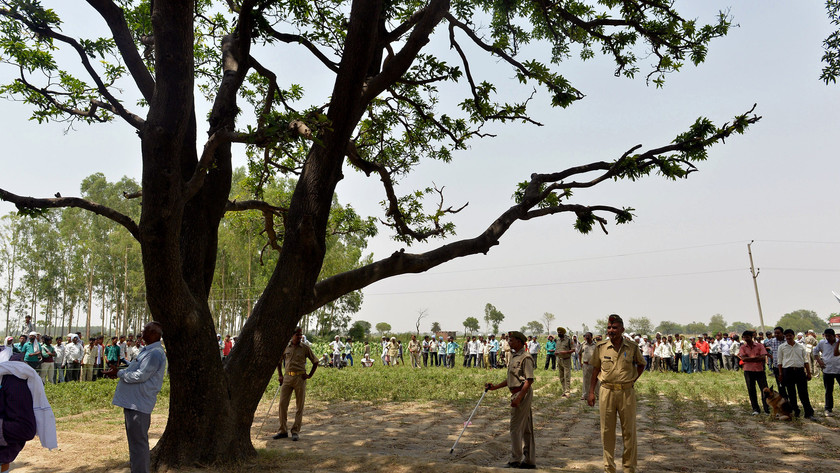June, 4, 2014

The young girls always traveled in pairs when walking to the wheat fields near their northern Indian village at night to relieve themselves before bed. That precaution wasn’t enough to prevent them from being raped and killed last week.
Women in Katra village, where the murders took place, describe the act of open defecation as one of fear and indecency, where the threat of attack and harassment is unavoidable. Three men are accused by police of abducting the girls, 12 and 14, before gang raping them, and then hanging them from a mango tree by their head scarves.
“We’re scared when we go into the fields because we have exposed ourselves and there’s no protection,” said Sridevi, the mother of one of the victims, sitting in a shady corner of her home under police protection. Her last name is being withheld under a law that grants victims anonymity. “The world doesn’t offer us the decency to let us defecate in private.”
Typically considered a private moment, relieving oneself may now become one of India’s most public issues in the aftermath of the killings. Prime Minister Narendra Modi, who won the largest electoral mandate in 30 years last month, vowed to build a toilet in every home in a nation where half of India’s 1.2 billion people currently defecate in the open, the highest number in the world.
Nine of out of ten women and girls say they have faced harassment when going to the bathroom in Bhopal, the capital of the central Indian state of Madhya Pradesh, according a report by WaterAid in 2012. About a third said they have been assaulted, the survey said, without saying how many women it interviewed.
“When women go to the fields they are easy prey for men,” said Shaibal Gupta, an economist at the Asian Development Research Institute in Patna in the eastern state of Bihar. “I struggle to describe it. It’s one of the most dastardly acts imaginable.”
The cousins set off into the fields just after dusk on May 27. Like the majority of people in their village, they didn’t have a toilet at home so they were forced to defecate in the open. For women this poses particular risks, as traditions on modesty mean they usually have to go in the dark and travel with someone else for safety.
The victims walked a quarter-mile along a narrow dirt path that opened up into fields of wheat and cereals where cows and water buffaloes graze in the day under the shade of mango and eucalyptus trees, according to an uncle called Baburam who was in the field at the time of the attack. The girls stopped on a small patch of land full of sharp, thorny bushes growing about a foot off the ground. They were then kidnapped.
“This vicious, horrifying attack illustrates too vividly the risks that girls and women take when they don’t have a safe, private place to relieve themselves,” said Barbara Frost, the London-based chief executive of WaterAid, a charity that helps poor communities get access to sanitation. “Ending open defecation is an urgent priority that needs to be addressed.”
While India has been one of the world’s fastest-growing major economies for much of the past decade, sending rockets into space and giving rise to a class of billionaires, it has lagged on social indicators. About 626 million Indians defecate in the open, compared with 14 million in China, the World Health Organization said in a 2012 report.
“The possibility of space missions seems to capture the imagination of the privileged far more than flush toilets,” Nobel-prize winner Amartya Sen and development economist Jean Dreze wrote in their 2013 book “An Uncertain Glory: India and its Contradictions.”
The United Nations held a campaign earlier this year to encourage Indians to build more toilets called “Take Poo to the Loo.” A video featured a young man being chased by human excrement until he builds a toilet and flushes it away.
India’s shortage of toilets costs the country more than $50 billion a year, mostly through premature deaths and hygiene-related diseases, according a 2010 study by the World Bank. India suffers a greater cost than other Asian countries from the inadequate collection of human excreta, the study found.
Modi’s ruling Bharatiya Janata Party promised in its manifesto to help people build toilets in homes, at schools and in public places to end open defecation. In October, Modi said if elected he’d plan to build “toilets first, temples later.”
“We will certainly be coordinating with the health ministry to see that toilets are a priority of this government,” Maneka Gandhi, Women and Child Development minister in Modi’s week-old government, told reporters yesterday when asked what his administration will do to reduce rapes.
The Congress party, which was in power for a decade until it was ousted last month, also promised it would build a toilet in every home in its 2014 campaign manifesto. Jairam Ramesh, the rural development minister under Congress, told women in 2012 not to get married into families that don’t have toilets.
Sulabh International, a New Delhi-based organization that has built public toilets and campaigned on human emancipation issues since 1970, will build toilets in every household in the village where the attack took place, Suresh Prasad, vice president of the organization, said in a phone interview. Work will begin in the next two weeks, he said.
“Building a toilet in my home won’t bring my daughter back,” Sridevi, the victim’s mother, said from her home. “It’s too late. The police and government never cared to give us security and decency so we could use the bathroom, and now my daughter is dead.”
Bloomberg
Video Story